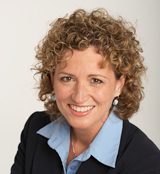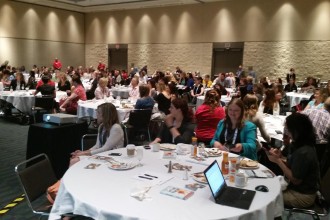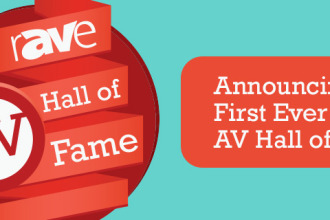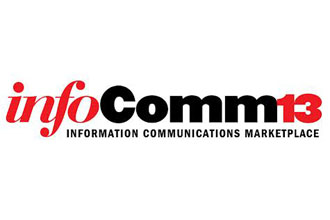Live Events Q&A: Johanne Bélanger, AVW-TELAV
 Johanne Bélanger is president of AVW-TELAV Audio Visual Solutions, a full-service AV rental and staging company and design/build firm that supports corporate events, exhibit programs, trade shows and conventions of all sizes. In 2010, AVW-TELAV was an inaugural recipient of InfoComm International®’s Green AV Award, which recognized the company’s efforts to operate more sustainably and to deliver sustainable solutions to its clients.
Johanne Bélanger is president of AVW-TELAV Audio Visual Solutions, a full-service AV rental and staging company and design/build firm that supports corporate events, exhibit programs, trade shows and conventions of all sizes. In 2010, AVW-TELAV was an inaugural recipient of InfoComm International®’s Green AV Award, which recognized the company’s efforts to operate more sustainably and to deliver sustainable solutions to its clients.In November 2011, Bélanger was elected Secretary-Treasurer of the InfoComm Board of Directors. In an interview, she shared her thoughts on the association’s evolution and on the state of the rental and staging industry.
InfoComm: Congratulations on your election to Secretary-Treasurer. Can you describe your involvement with InfoComm over the years and why you wanted to get involved?
Bélanger: InfoComm International has been a priority for me since joining AVW-TELAV in 2005. My predecessors placed great importance on the organization’s mandate. For instance, Harald Thiel, past president of AVW-TELAV Canada, was the only two-time president of InfoComm, and Ed Goodman, one of our company’s original founders and another past president of InfoComm, was recognized by InfoComm for his lifetime contributions to the industry. So I knew InfoComm was the perfect outlet to lend my voice to.
That’s one of the reasons I was extremely honored when elected to serve on the InfoComm Board of Directors for a one-year term in 2009. At the end of that year, I was nominated again to serve a two-year term. During that term, I had the pleasure of leading the Live Events Focus Group, which brought together senior executives in the live events market to determine the current status of the live events marketplace in North America and identify ways in which InfoComm could better serve our live events members.
As you know, this past November, I was elected as the board’s Secretary-Treasurer, which I will serve for a one-year term. I plan to continue representing and shaping the direction of the audiovisual industry with my colleagues on the board and look forward to new opportunities and challenges the future may bring.
InfoComm: From your point of view, how has InfoComm evolved? Where do you see it going next?
Bélanger: InfoComm has evolved to embrace a larger part of the rental and staging sector of the business, particularly in areas of education and training, certification and standardization. This is especially important to me as AVW-TELAV’s president, since our company has just made the strategic decision to focus its business primarily on the rental, event staging and facility markets. I expect that we’ll see an expansion of InfoComm’s rental and staging training, with more advanced courses and multiple levels of certification.
In addition, with the timely creation of task forces and focus groups, such as the Live Events Focus Group I chaired last year to address the needs of our live events members, InfoComm keeps its ear to the ground to observe and predict industry issues, educate members and take action, when necessary. If the organization continues to handle matters in this fashion, I think it will have a much larger impact on our industry by setting higher standards and garner greater recognition of the AV industry by the general public.
InfoComm: In general, how has the live events industry changed in recent years? What challenges does AVW-TELAV face that maybe it didn’t face five years ago?
Bélanger: We have seen our industry become more price-driven in recent years. As the technology becomes cheaper and easier to purchase, there is less exclusivity associated with larger AV firms, such as ours. As such, offering value-added services, rather than commodities, is the key to future growth. We are also seeing much more pressure on margins as customers continue to demand discounted rates in a very competitive marketplace. We believe that this new reality is here to stay and that companies must learn to adapt by executing more efficiently and finding new ways to do business.
In regards to equipment, we have been slowly moving away from proprietary AV boxes and towards computer-based solutions with add-ons, which provide the same result at a lower cost with higher performance.
InfoComm: To what extent do issues that the pro AV industry is now dealing with (specifically the intersection of AV and IT technologies) impact rental and staging/live events?
Bélanger: We continue to see more use of digital technology in live events and expect that this trend will continue, especially as more events seek to incorporate a virtual program to go along with the live event.
That said, large-scale IT networks in the professional AV events market are not as prevalent. Yes, there is networking and data moving across the network. However, networks in rental and staging are primarily for controlling AV equipment. The AV signal is still separate and off the network. We are not seeing the merging of data, communication, and sources moving across a specialized single network, like one would in the integration market.
InfoComm: AVW-TELAV has an outstanding record on sustainability issues (the company won InfoComm’s Green AV Award in 2010). What about other rental and staging companies? What can they do to improve their sustainability records?
Bélanger: I cannot comment on how other companies are doing, but I can share with you the path AVW-TELAV took, which led to us becoming leaders in the green AV movement. Our first step was developing our company’s green policy in 2006. Shortly after, we established a Green Committee, made up of employees from each of our branches who expressed a keen interest in helping make AVW-TELAV a more environmentally-friendly organization. This committee worked as a conduit through which green ideas flowed from all levels of the organization. After researching the sustainability suggestions—most of which were small in effort but great in impact—we implemented the ones with merit, and then reported the outcome to the rest of the company to inspire all of the employees.
As a company, we didn’t spend a significant amount of money to make environmentally-conscientious changes, like switching to more energy-efficient bulbs in our simultaneous interpretation booths or offering barely-used batteries to our employees for reuse. We just looked at the simple things and found ways to adapt to doing them more efficiently.
Now that it has become more commonplace for our employees to speak up when they see areas for improvement around their branches and on show sites, from a sustainability perspective, we’ve decided to broaden our reach with our new “You Care, So We Care” committee, which tackles social responsibility issues on a larger scale.
This is the model that has worked for us and is still working. Perhaps rental and staging companies that want to become more environmentally sound may use our journey as an example. We can all improve our sustainability practices and the first step toward doing so is awareness. A sustainability champion is a great way for a company to elevate awareness and implement and effective sustainability program.
InfoComm: What would you tell rental and staging companies that might be reluctant to embrace InfoComm and some of its key initiatives, such as certification and standards?
Bélanger: The rental and staging industry is still in its infancy and must prove itself as a bona fide industry with a level of standards that can be trusted. Customers don’t have the means to judge which company is most qualified to do the job; many don’t even know the right questions to ask and are basically charmed by whichever company has the best salespeople.
InfoComm is working towards solidifying live events as a reputable industry, with proper performance and safety processes to follow and standards to be met. Those companies that are seen as leading the industry towards this standardization will have a competitive advantage. Similarly, the public will be able to distinguish which are the most capable live events specialists based on levels of expertise that they can trust and verify.
The professionalism of our industry has improved tremendously as a result of InfoComm programs. Customers are becoming aware of InfoComm certifications and standards. I think it will become more and more difficult for companies to be competitive if they do not use the resources that InfoComm can offer.





